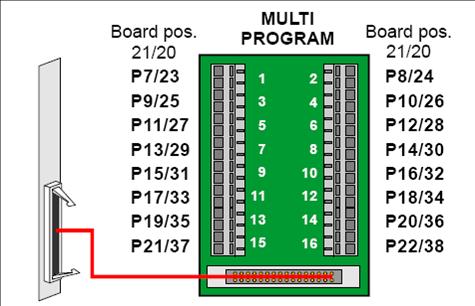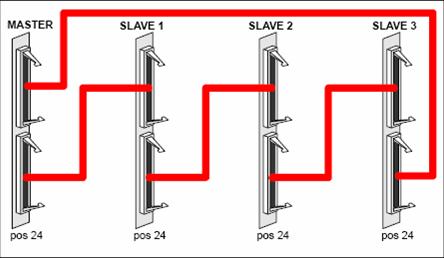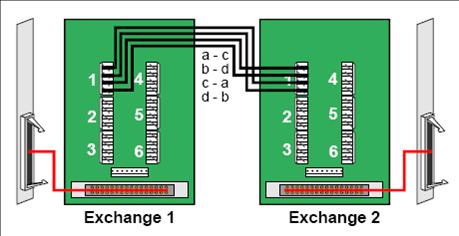AGA - AlphaCom General Purpose Audio Board
From Zenitel Wiki
The AGA board is a general purpose audio interface for program feeding or speech communication between modules. When used as audio program feed board there is room for max. two boards placed in positions 21 and 20.
When used for communication between modules each board provides 8 speech channels in a communication ring in a MultiModule AlphaCom system. There can be 1 to 3 AGA boards for this purpose in one module, placed in positions 24, 23 and 22.
Easily accessible potentiometers at the front enable sensitivity control of the audio channels.
Highlights
- Circuitry for feeding 16 audio program channels into and/or out of the AlphaCom exchange under software control
- Provides 6 channels for two-way speech communication between nodes in an AlphaNet system
- Can be used for special features such as duplex conferencing and volume control for group calls
- 600 ohms 0dB galvanic isolated input/output via transformer
- Termination on board with jumpers
- Board can add internal and external audio sources to an audio input/output
- Provides 8 channels for two-way speech communication between modules in a multimodule system
- Individually adjustable sensitivity (gain) for all channels
- Coded connector to ensure correct positioning in the module
- Hot-plug in/plug out
Additional Documentation on Zenitel.com
Used for:
Audio Program
Each board provides 16 audio inputs for program distribution when used in AlphaCom XE20 or XE26. There can be 1 or 2 boards in a module placed in positions 20 and 21.
AGA boards can be placed in board position 1- 6 in an XE7 exchange, but the number of channels are reduced to 6 on one board. The input level is adjusted with potensiometers 4, 6, 8, 10, 12 and 14. The program sources are connected to the ‘c’ and ‘d’ terminals on the back plane.
An AGA connection kit 1009930300 needs to be purchased to connect the audio sources. The kit contains a filter board, a connection board and an interface cable.
RingMaster Audio Interface
When integrating AlphaCom XE server with RingMaster CB901 the AGA must be used as an Audio Interface.
See article: M100 and AlphaCom interfacing
M100 Audio Interface
When integrating AlphaCom XE server with Philips M100 the AGA must be used as an Audio Interface.
See article: CB901 and AlphaCom E interfacing
MultiModule
Note! For AlphaCom E and XE servers the AGA is not needed for MultiModule. MultiModule audio is achieved through VoIP.
Each board provides 8 audio channels in a communication ring in AlphaCom 80+/138. In an AlphaCom M, line 1 and 8 are not used, thus providing 6 audio channels.
There can be 1-3 boards in each module placed in positions 22, 23 and 24 in 80+/138. In AlphaCom M the positions 4, 5 and 6 can be used.
The AGA boards must be located in the same positions in the Master and Slave modules.
The Installation set for Multi Module (1009930303) has to be purchased.
AlphaNet
Note! For AlphaCom E and XE servers the AGA is not needed for AlphaNet. AlphaNet audio is achieved through VoIP.
Each board provides 6 audio channels between the exchanges. There can be any number of AGA boards in each exchange placed in any position. Pos 20-23 are recommended in AlphaCom 138 to avoid modifications of the backplane. Use the same filter board with cable and connection board as ASLT. Audio output is on ab-wires, audio input on cd-wires.
Station
Information missing
Duplex Conference
The Duplex Conference requires proper installation of an AGA board.
At least one AGA board is needed, and some AGA resources must be programmed to Open Duplex Conf Mixer in Exchange & System -> Board. (Each “port” defined in AlphaPro makes two mixer circuits, each 1/16th of AGA). In case of MultiModule, the AGA board must be located in the Master module.




